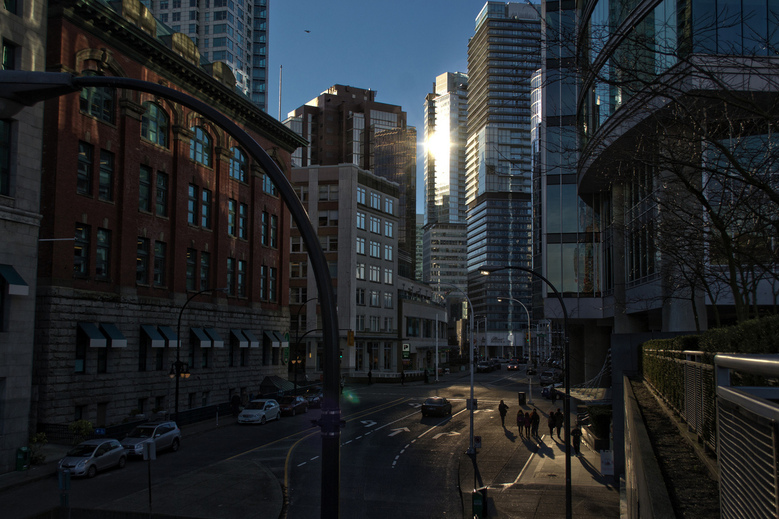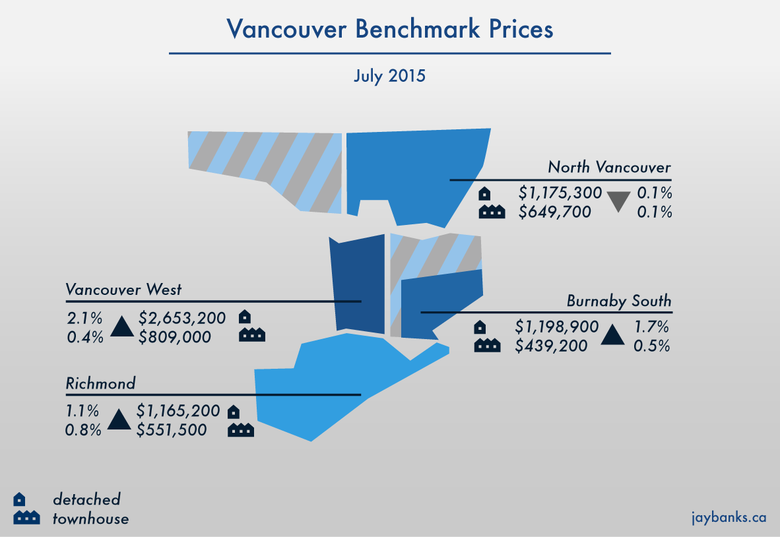The hot dry weather and market activity continue hand in hand. Always a surprise to have this much activity in the middle of what is normally a very short summer. However the months of sunshine have created a new normal and buyers don’t feel they have to run to the beach to catch the few available rays. Instead they are out at open houses and making offers on the few available properties.
It’s not true all across Canada, only in Vancouver and Toronto. Smaller cities have had a slight downturn in July but it is largely attributable to lower inventory of homes for sale.
Darcy McLeod, President of the Real Estate Board of Greater Vancouver, states that
much of today’s activity can be traced to strong consumer confidence, low interest rates, and a reduced supply of homes for sale. We have about 5,000 to 6,000 fewer homes for sale today than we’ve seen at this time of year over the last five to six years.
 Overlook by Asher Isbrucker
Overlook by Asher Isbrucker
In fact the latest CMHC projections are for a strong BC economy and real estate picture in Vancouver as opposed to a possible downward adjustment in Toronto mainly caused by an overbuilt new condo sector. Due to the concern of developers there about the absorption rate of new condos many of them are selling their condo sites and building permits to institutional investors for market rental housing as a source of a permanent cash flow for pension funds etc.
The big unknown in Vancouver is whether international buyers and investors are raising the price point of detached homes to such levels that local buyers cannot afford to purchase homes in Vancouver Westside (benchmark price $2,650,000) or West Vancouver (benchmark price $2,359,000) thus placing more buying pressure on the homes in Vancouver East (benchmark price $1,116,000), Richmond (benchmark price $1,165,000) and North Vancouver (benchmark price $1,175,000). The fact that the Loonie is now worth $.76 US is making Vancouver real estate more attractive than ever. Those high prices are discounted 25% for off shore buyers.
Interesting stats on a mainly unknowable source of buyers comes from Macdonald Realty vice-president Dan Scarrow who is resident manager of the Macdonald Realty office in Shanghai, China. Macdonald Realty Ltd says that in 2014 cash buyers from mainland China purchased 70% of the firm’s detached, townhome and condo sales over $3 million. Scarrow says that Chinese buyers are driving the luxury market but not so much the $1 million or lower price range. Scarrow states that the rising prices are caused by a shortage of homes available for sale to an increasing population. One interesting suggestion Scarrow made was that Vancouver should raise their property taxes which are currently below 0.5% compared with 1% in Toronto and 2-3% in some American cities.
 Vancouver Benchmark Prices - July 2015
Vancouver Benchmark Prices - July 2015
Because its election season and these issues are a red flag to many voters the Prime Minister is now reversing federal policy on collecting foreign ownership data and saying the federal government will spend $500k to track foreign buyers and how much they are impacting housing affordability in Vancouver and Toronto. The theme being that if foreign non-resident investors are driving up the cost of real estate the government will institute new requirements to mitigate this effect. This would line Canada up with rules in Australia, the UK and Singapore. The Bank of Canada attributes the high prices to all buyers, foreign and local, taking advantage of historic low interest rates.
This drama about new regulations to slow the housing market is causing alarm for the BC government. Premier Christy Clark states that limiting foreign investment would not lower prices but would instead damage the economy . According to information provided to the Vancouver Sun by Stats Canada, in 2011 real estate agents, brokers and related activities generated $1.93 billion in GDP in BC which was 1% of the total provincial total of GDP. If real estate sales activities, construction and renovations are added together they contributed almost $12 billion to the economy and 6% of the GDP for BC in 2012. There is some feeling among economists that increased density, rezoning and less NIMBYism would solve any housing crisis in British Columbia without destroying the economic engine created by real estate growth.
JB00DT

